Coaching and Mentoring Report: Principles, Processes, and Evaluation
VerifiedAdded on 2019/10/09
|12
|2889
|305
Report
AI Summary
This report delves into the concepts of coaching and mentoring, outlining their principles, benefits, and practical applications within organizations. It differentiates between coaching and mentoring, highlighting the processes, tools, and communication skills essential for effective implementation. The report emphasizes the importance of establishing clear contracts and measuring success. It also includes a case study involving a sales representative, detailing an initial engagement, a timetable, and a two-way feedback form to illustrate the practical application of coaching techniques. The author reflects on their experience, focusing on how to train individuals, build confidence, and address performance issues within a professional context. This report provides valuable insights into the strategic use of coaching and mentoring to foster individual and organizational growth.
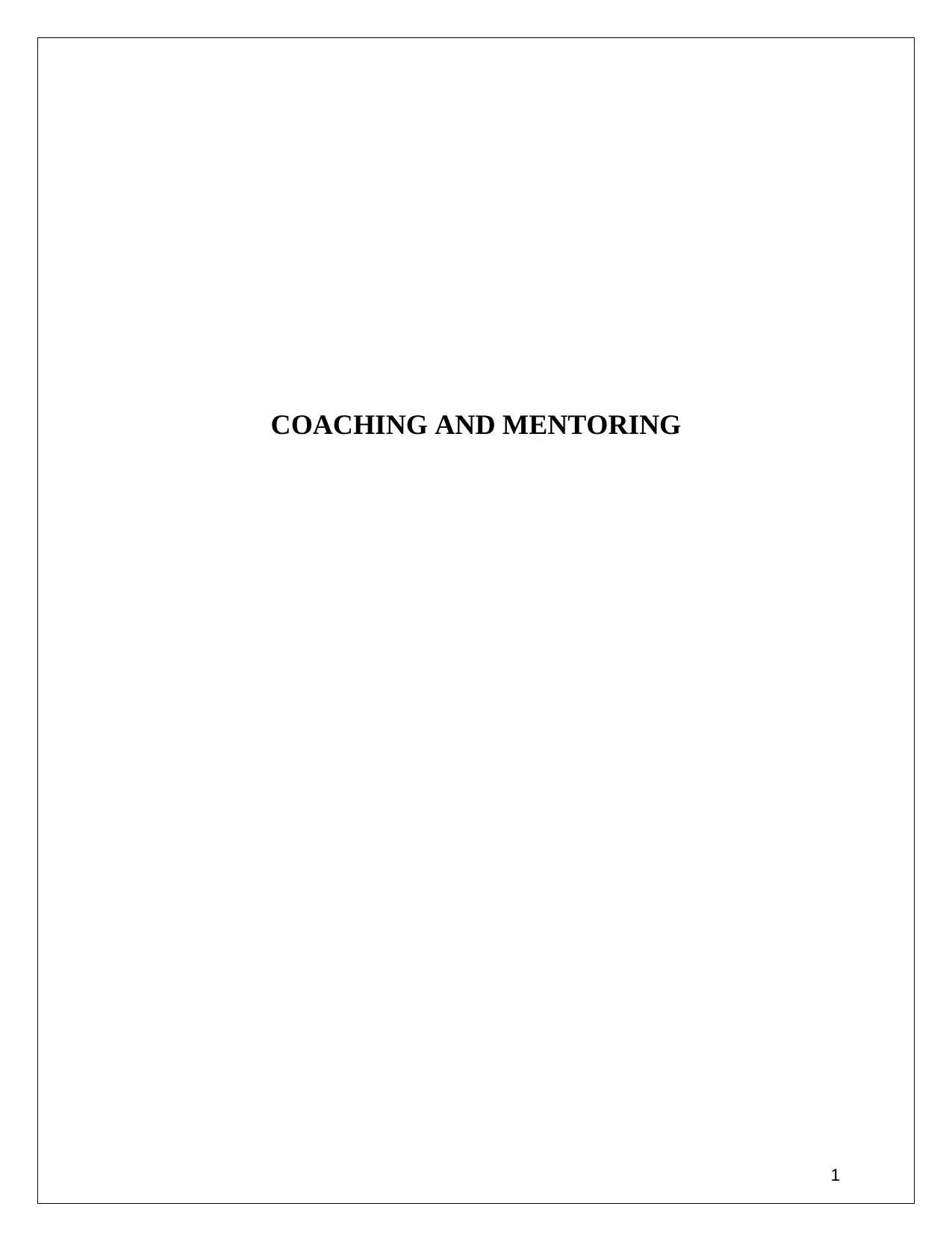
COACHING AND MENTORING
1
1
Paraphrase This Document
Need a fresh take? Get an instant paraphrase of this document with our AI Paraphraser
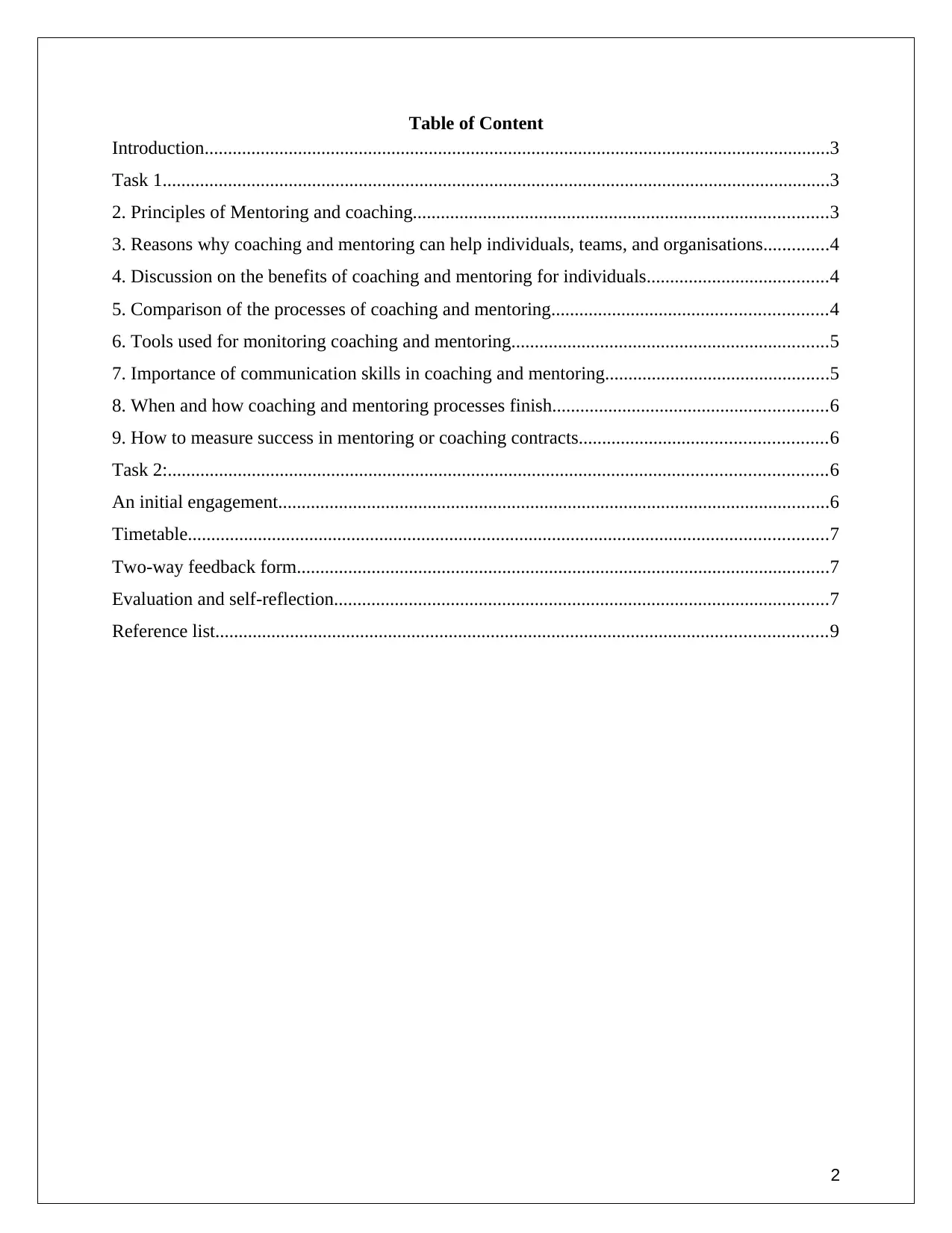
Table of Content
Introduction......................................................................................................................................3
Task 1...............................................................................................................................................3
2. Principles of Mentoring and coaching.........................................................................................3
3. Reasons why coaching and mentoring can help individuals, teams, and organisations..............4
4. Discussion on the benefits of coaching and mentoring for individuals.......................................4
5. Comparison of the processes of coaching and mentoring...........................................................4
6. Tools used for monitoring coaching and mentoring....................................................................5
7. Importance of communication skills in coaching and mentoring................................................5
8. When and how coaching and mentoring processes finish...........................................................6
9. How to measure success in mentoring or coaching contracts.....................................................6
Task 2:.............................................................................................................................................6
An initial engagement......................................................................................................................6
Timetable.........................................................................................................................................7
Two-way feedback form..................................................................................................................7
Evaluation and self-reflection..........................................................................................................7
Reference list...................................................................................................................................9
2
Introduction......................................................................................................................................3
Task 1...............................................................................................................................................3
2. Principles of Mentoring and coaching.........................................................................................3
3. Reasons why coaching and mentoring can help individuals, teams, and organisations..............4
4. Discussion on the benefits of coaching and mentoring for individuals.......................................4
5. Comparison of the processes of coaching and mentoring...........................................................4
6. Tools used for monitoring coaching and mentoring....................................................................5
7. Importance of communication skills in coaching and mentoring................................................5
8. When and how coaching and mentoring processes finish...........................................................6
9. How to measure success in mentoring or coaching contracts.....................................................6
Task 2:.............................................................................................................................................6
An initial engagement......................................................................................................................6
Timetable.........................................................................................................................................7
Two-way feedback form..................................................................................................................7
Evaluation and self-reflection..........................................................................................................7
Reference list...................................................................................................................................9
2
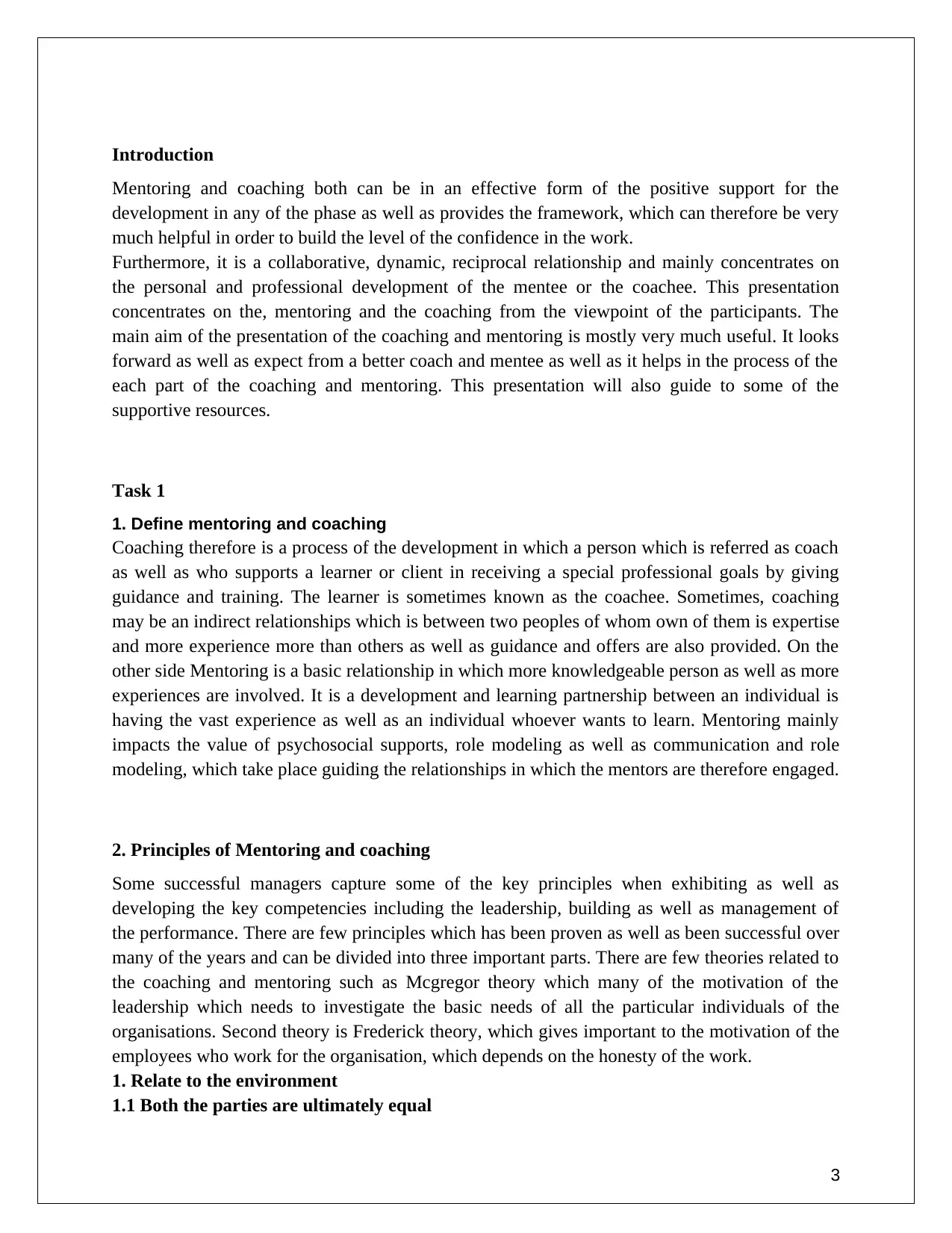
Introduction
Mentoring and coaching both can be in an effective form of the positive support for the
development in any of the phase as well as provides the framework, which can therefore be very
much helpful in order to build the level of the confidence in the work.
Furthermore, it is a collaborative, dynamic, reciprocal relationship and mainly concentrates on
the personal and professional development of the mentee or the coachee. This presentation
concentrates on the, mentoring and the coaching from the viewpoint of the participants. The
main aim of the presentation of the coaching and mentoring is mostly very much useful. It looks
forward as well as expect from a better coach and mentee as well as it helps in the process of the
each part of the coaching and mentoring. This presentation will also guide to some of the
supportive resources.
Task 1
1. Define mentoring and coaching
Coaching therefore is a process of the development in which a person which is referred as coach
as well as who supports a learner or client in receiving a special professional goals by giving
guidance and training. The learner is sometimes known as the coachee. Sometimes, coaching
may be an indirect relationships which is between two peoples of whom own of them is expertise
and more experience more than others as well as guidance and offers are also provided. On the
other side Mentoring is a basic relationship in which more knowledgeable person as well as more
experiences are involved. It is a development and learning partnership between an individual is
having the vast experience as well as an individual whoever wants to learn. Mentoring mainly
impacts the value of psychosocial supports, role modeling as well as communication and role
modeling, which take place guiding the relationships in which the mentors are therefore engaged.
2. Principles of Mentoring and coaching
Some successful managers capture some of the key principles when exhibiting as well as
developing the key competencies including the leadership, building as well as management of
the performance. There are few principles which has been proven as well as been successful over
many of the years and can be divided into three important parts. There are few theories related to
the coaching and mentoring such as Mcgregor theory which many of the motivation of the
leadership which needs to investigate the basic needs of all the particular individuals of the
organisations. Second theory is Frederick theory, which gives important to the motivation of the
employees who work for the organisation, which depends on the honesty of the work.
1. Relate to the environment
1.1 Both the parties are ultimately equal
3
Mentoring and coaching both can be in an effective form of the positive support for the
development in any of the phase as well as provides the framework, which can therefore be very
much helpful in order to build the level of the confidence in the work.
Furthermore, it is a collaborative, dynamic, reciprocal relationship and mainly concentrates on
the personal and professional development of the mentee or the coachee. This presentation
concentrates on the, mentoring and the coaching from the viewpoint of the participants. The
main aim of the presentation of the coaching and mentoring is mostly very much useful. It looks
forward as well as expect from a better coach and mentee as well as it helps in the process of the
each part of the coaching and mentoring. This presentation will also guide to some of the
supportive resources.
Task 1
1. Define mentoring and coaching
Coaching therefore is a process of the development in which a person which is referred as coach
as well as who supports a learner or client in receiving a special professional goals by giving
guidance and training. The learner is sometimes known as the coachee. Sometimes, coaching
may be an indirect relationships which is between two peoples of whom own of them is expertise
and more experience more than others as well as guidance and offers are also provided. On the
other side Mentoring is a basic relationship in which more knowledgeable person as well as more
experiences are involved. It is a development and learning partnership between an individual is
having the vast experience as well as an individual whoever wants to learn. Mentoring mainly
impacts the value of psychosocial supports, role modeling as well as communication and role
modeling, which take place guiding the relationships in which the mentors are therefore engaged.
2. Principles of Mentoring and coaching
Some successful managers capture some of the key principles when exhibiting as well as
developing the key competencies including the leadership, building as well as management of
the performance. There are few principles which has been proven as well as been successful over
many of the years and can be divided into three important parts. There are few theories related to
the coaching and mentoring such as Mcgregor theory which many of the motivation of the
leadership which needs to investigate the basic needs of all the particular individuals of the
organisations. Second theory is Frederick theory, which gives important to the motivation of the
employees who work for the organisation, which depends on the honesty of the work.
1. Relate to the environment
1.1 Both the parties are ultimately equal
3
⊘ This is a preview!⊘
Do you want full access?
Subscribe today to unlock all pages.

Trusted by 1+ million students worldwide
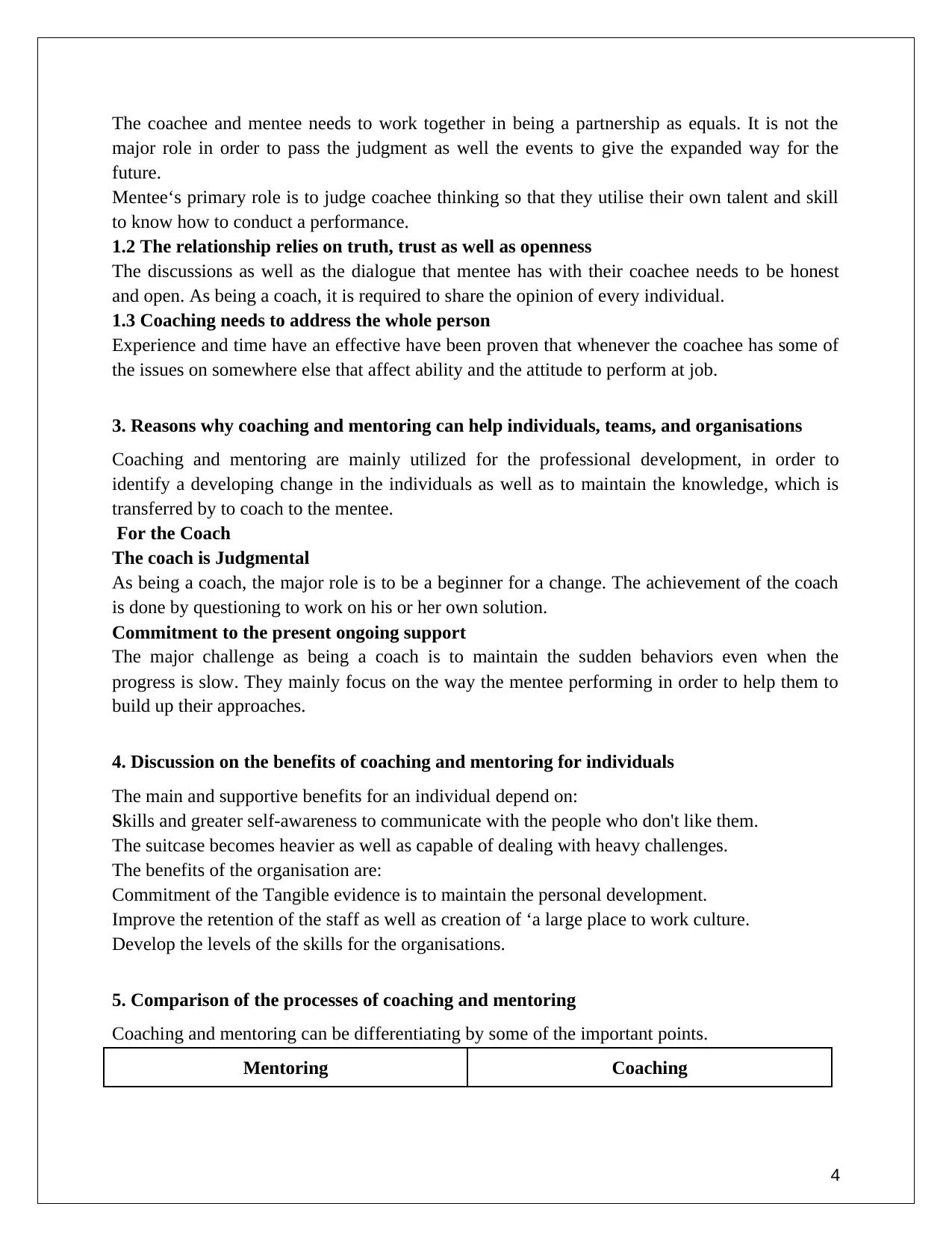
The coachee and mentee needs to work together in being a partnership as equals. It is not the
major role in order to pass the judgment as well the events to give the expanded way for the
future.
Mentee‘s primary role is to judge coachee thinking so that they utilise their own talent and skill
to know how to conduct a performance.
1.2 The relationship relies on truth, trust as well as openness
The discussions as well as the dialogue that mentee has with their coachee needs to be honest
and open. As being a coach, it is required to share the opinion of every individual.
1.3 Coaching needs to address the whole person
Experience and time have an effective have been proven that whenever the coachee has some of
the issues on somewhere else that affect ability and the attitude to perform at job.
3. Reasons why coaching and mentoring can help individuals, teams, and organisations
Coaching and mentoring are mainly utilized for the professional development, in order to
identify a developing change in the individuals as well as to maintain the knowledge, which is
transferred by to coach to the mentee.
For the Coach
The coach is Judgmental
As being a coach, the major role is to be a beginner for a change. The achievement of the coach
is done by questioning to work on his or her own solution.
Commitment to the present ongoing support
The major challenge as being a coach is to maintain the sudden behaviors even when the
progress is slow. They mainly focus on the way the mentee performing in order to help them to
build up their approaches.
4. Discussion on the benefits of coaching and mentoring for individuals
The main and supportive benefits for an individual depend on:
Skills and greater self-awareness to communicate with the people who don't like them.
The suitcase becomes heavier as well as capable of dealing with heavy challenges.
The benefits of the organisation are:
Commitment of the Tangible evidence is to maintain the personal development.
Improve the retention of the staff as well as creation of ‘a large place to work culture.
Develop the levels of the skills for the organisations.
5. Comparison of the processes of coaching and mentoring
Coaching and mentoring can be differentiating by some of the important points.
Mentoring Coaching
4
major role in order to pass the judgment as well the events to give the expanded way for the
future.
Mentee‘s primary role is to judge coachee thinking so that they utilise their own talent and skill
to know how to conduct a performance.
1.2 The relationship relies on truth, trust as well as openness
The discussions as well as the dialogue that mentee has with their coachee needs to be honest
and open. As being a coach, it is required to share the opinion of every individual.
1.3 Coaching needs to address the whole person
Experience and time have an effective have been proven that whenever the coachee has some of
the issues on somewhere else that affect ability and the attitude to perform at job.
3. Reasons why coaching and mentoring can help individuals, teams, and organisations
Coaching and mentoring are mainly utilized for the professional development, in order to
identify a developing change in the individuals as well as to maintain the knowledge, which is
transferred by to coach to the mentee.
For the Coach
The coach is Judgmental
As being a coach, the major role is to be a beginner for a change. The achievement of the coach
is done by questioning to work on his or her own solution.
Commitment to the present ongoing support
The major challenge as being a coach is to maintain the sudden behaviors even when the
progress is slow. They mainly focus on the way the mentee performing in order to help them to
build up their approaches.
4. Discussion on the benefits of coaching and mentoring for individuals
The main and supportive benefits for an individual depend on:
Skills and greater self-awareness to communicate with the people who don't like them.
The suitcase becomes heavier as well as capable of dealing with heavy challenges.
The benefits of the organisation are:
Commitment of the Tangible evidence is to maintain the personal development.
Improve the retention of the staff as well as creation of ‘a large place to work culture.
Develop the levels of the skills for the organisations.
5. Comparison of the processes of coaching and mentoring
Coaching and mentoring can be differentiating by some of the important points.
Mentoring Coaching
4
Paraphrase This Document
Need a fresh take? Get an instant paraphrase of this document with our AI Paraphraser
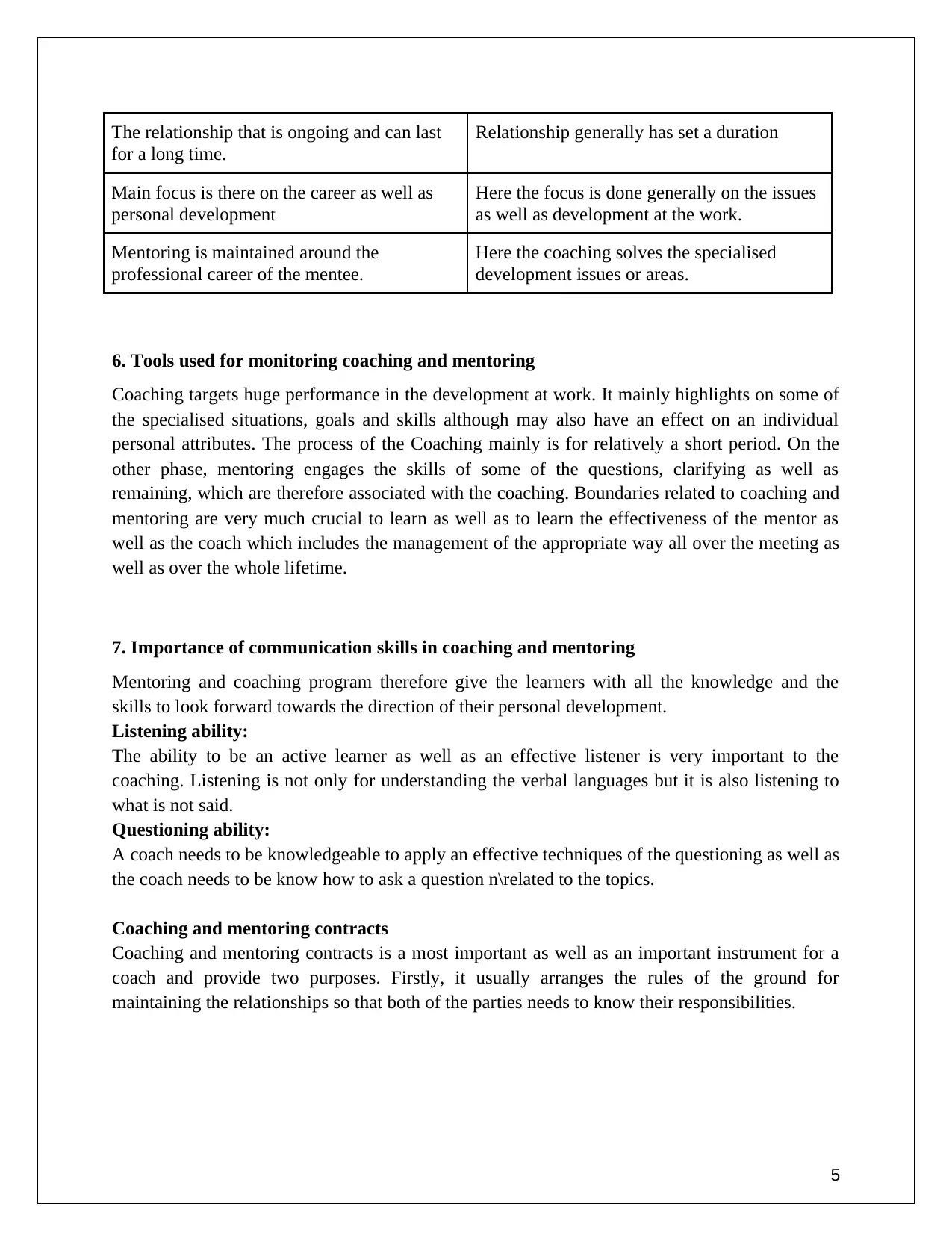
The relationship that is ongoing and can last
for a long time.
Relationship generally has set a duration
Main focus is there on the career as well as
personal development
Here the focus is done generally on the issues
as well as development at the work.
Mentoring is maintained around the
professional career of the mentee.
Here the coaching solves the specialised
development issues or areas.
6. Tools used for monitoring coaching and mentoring
Coaching targets huge performance in the development at work. It mainly highlights on some of
the specialised situations, goals and skills although may also have an effect on an individual
personal attributes. The process of the Coaching mainly is for relatively a short period. On the
other phase, mentoring engages the skills of some of the questions, clarifying as well as
remaining, which are therefore associated with the coaching. Boundaries related to coaching and
mentoring are very much crucial to learn as well as to learn the effectiveness of the mentor as
well as the coach which includes the management of the appropriate way all over the meeting as
well as over the whole lifetime.
7. Importance of communication skills in coaching and mentoring
Mentoring and coaching program therefore give the learners with all the knowledge and the
skills to look forward towards the direction of their personal development.
Listening ability:
The ability to be an active learner as well as an effective listener is very important to the
coaching. Listening is not only for understanding the verbal languages but it is also listening to
what is not said.
Questioning ability:
A coach needs to be knowledgeable to apply an effective techniques of the questioning as well as
the coach needs to be know how to ask a question n\related to the topics.
Coaching and mentoring contracts
Coaching and mentoring contracts is a most important as well as an important instrument for a
coach and provide two purposes. Firstly, it usually arranges the rules of the ground for
maintaining the relationships so that both of the parties needs to know their responsibilities.
5
for a long time.
Relationship generally has set a duration
Main focus is there on the career as well as
personal development
Here the focus is done generally on the issues
as well as development at the work.
Mentoring is maintained around the
professional career of the mentee.
Here the coaching solves the specialised
development issues or areas.
6. Tools used for monitoring coaching and mentoring
Coaching targets huge performance in the development at work. It mainly highlights on some of
the specialised situations, goals and skills although may also have an effect on an individual
personal attributes. The process of the Coaching mainly is for relatively a short period. On the
other phase, mentoring engages the skills of some of the questions, clarifying as well as
remaining, which are therefore associated with the coaching. Boundaries related to coaching and
mentoring are very much crucial to learn as well as to learn the effectiveness of the mentor as
well as the coach which includes the management of the appropriate way all over the meeting as
well as over the whole lifetime.
7. Importance of communication skills in coaching and mentoring
Mentoring and coaching program therefore give the learners with all the knowledge and the
skills to look forward towards the direction of their personal development.
Listening ability:
The ability to be an active learner as well as an effective listener is very important to the
coaching. Listening is not only for understanding the verbal languages but it is also listening to
what is not said.
Questioning ability:
A coach needs to be knowledgeable to apply an effective techniques of the questioning as well as
the coach needs to be know how to ask a question n\related to the topics.
Coaching and mentoring contracts
Coaching and mentoring contracts is a most important as well as an important instrument for a
coach and provide two purposes. Firstly, it usually arranges the rules of the ground for
maintaining the relationships so that both of the parties needs to know their responsibilities.
5
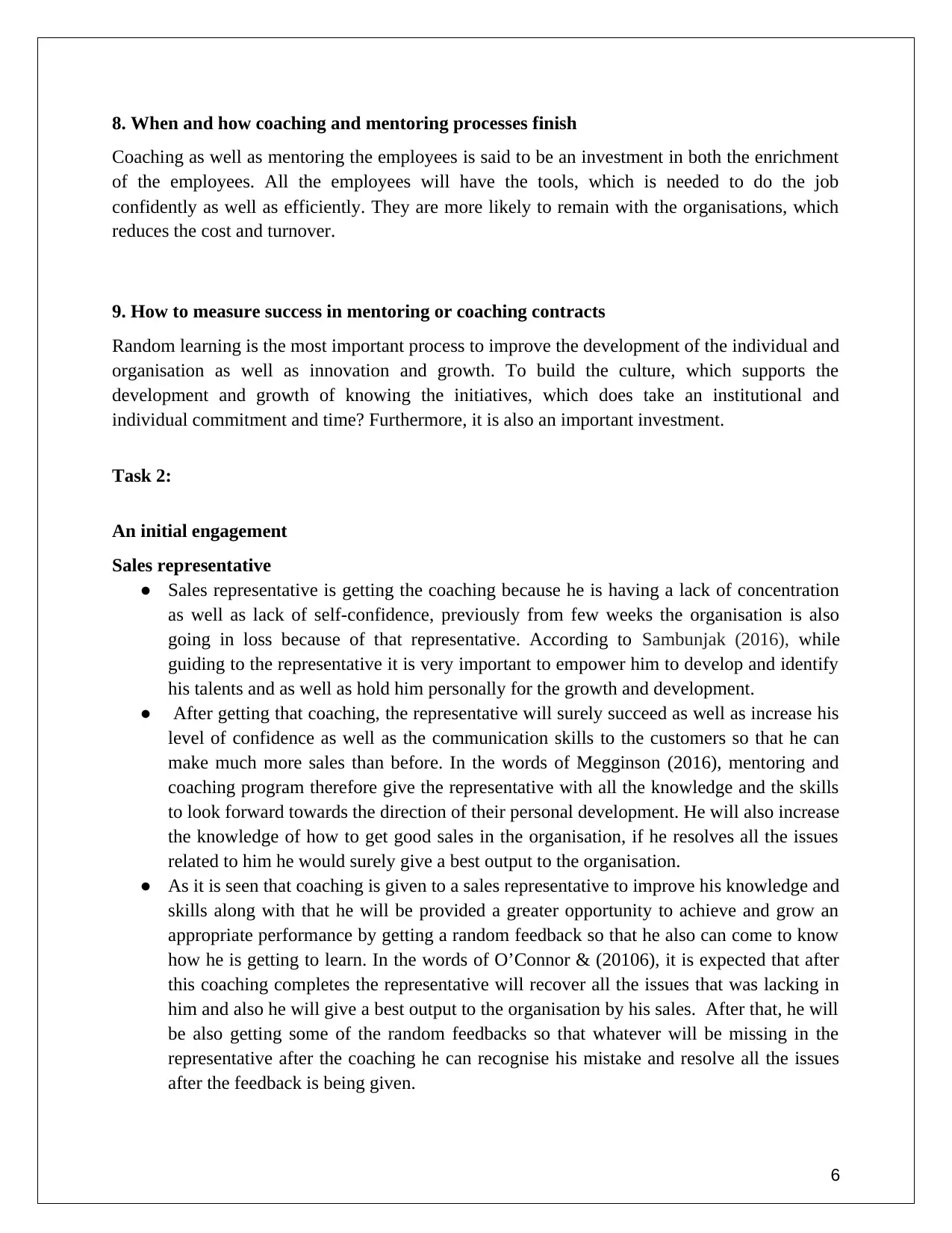
8. When and how coaching and mentoring processes finish
Coaching as well as mentoring the employees is said to be an investment in both the enrichment
of the employees. All the employees will have the tools, which is needed to do the job
confidently as well as efficiently. They are more likely to remain with the organisations, which
reduces the cost and turnover.
9. How to measure success in mentoring or coaching contracts
Random learning is the most important process to improve the development of the individual and
organisation as well as innovation and growth. To build the culture, which supports the
development and growth of knowing the initiatives, which does take an institutional and
individual commitment and time? Furthermore, it is also an important investment.
Task 2:
An initial engagement
Sales representative
● Sales representative is getting the coaching because he is having a lack of concentration
as well as lack of self-confidence, previously from few weeks the organisation is also
going in loss because of that representative. According to Sambunjak (2016), while
guiding to the representative it is very important to empower him to develop and identify
his talents and as well as hold him personally for the growth and development.
● After getting that coaching, the representative will surely succeed as well as increase his
level of confidence as well as the communication skills to the customers so that he can
make much more sales than before. In the words of Megginson (2016), mentoring and
coaching program therefore give the representative with all the knowledge and the skills
to look forward towards the direction of their personal development. He will also increase
the knowledge of how to get good sales in the organisation, if he resolves all the issues
related to him he would surely give a best output to the organisation.
● As it is seen that coaching is given to a sales representative to improve his knowledge and
skills along with that he will be provided a greater opportunity to achieve and grow an
appropriate performance by getting a random feedback so that he also can come to know
how he is getting to learn. In the words of O’Connor & (20106), it is expected that after
this coaching completes the representative will recover all the issues that was lacking in
him and also he will give a best output to the organisation by his sales. After that, he will
be also getting some of the random feedbacks so that whatever will be missing in the
representative after the coaching he can recognise his mistake and resolve all the issues
after the feedback is being given.
6
Coaching as well as mentoring the employees is said to be an investment in both the enrichment
of the employees. All the employees will have the tools, which is needed to do the job
confidently as well as efficiently. They are more likely to remain with the organisations, which
reduces the cost and turnover.
9. How to measure success in mentoring or coaching contracts
Random learning is the most important process to improve the development of the individual and
organisation as well as innovation and growth. To build the culture, which supports the
development and growth of knowing the initiatives, which does take an institutional and
individual commitment and time? Furthermore, it is also an important investment.
Task 2:
An initial engagement
Sales representative
● Sales representative is getting the coaching because he is having a lack of concentration
as well as lack of self-confidence, previously from few weeks the organisation is also
going in loss because of that representative. According to Sambunjak (2016), while
guiding to the representative it is very important to empower him to develop and identify
his talents and as well as hold him personally for the growth and development.
● After getting that coaching, the representative will surely succeed as well as increase his
level of confidence as well as the communication skills to the customers so that he can
make much more sales than before. In the words of Megginson (2016), mentoring and
coaching program therefore give the representative with all the knowledge and the skills
to look forward towards the direction of their personal development. He will also increase
the knowledge of how to get good sales in the organisation, if he resolves all the issues
related to him he would surely give a best output to the organisation.
● As it is seen that coaching is given to a sales representative to improve his knowledge and
skills along with that he will be provided a greater opportunity to achieve and grow an
appropriate performance by getting a random feedback so that he also can come to know
how he is getting to learn. In the words of O’Connor & (20106), it is expected that after
this coaching completes the representative will recover all the issues that was lacking in
him and also he will give a best output to the organisation by his sales. After that, he will
be also getting some of the random feedbacks so that whatever will be missing in the
representative after the coaching he can recognise his mistake and resolve all the issues
after the feedback is being given.
6
⊘ This is a preview!⊘
Do you want full access?
Subscribe today to unlock all pages.

Trusted by 1+ million students worldwide
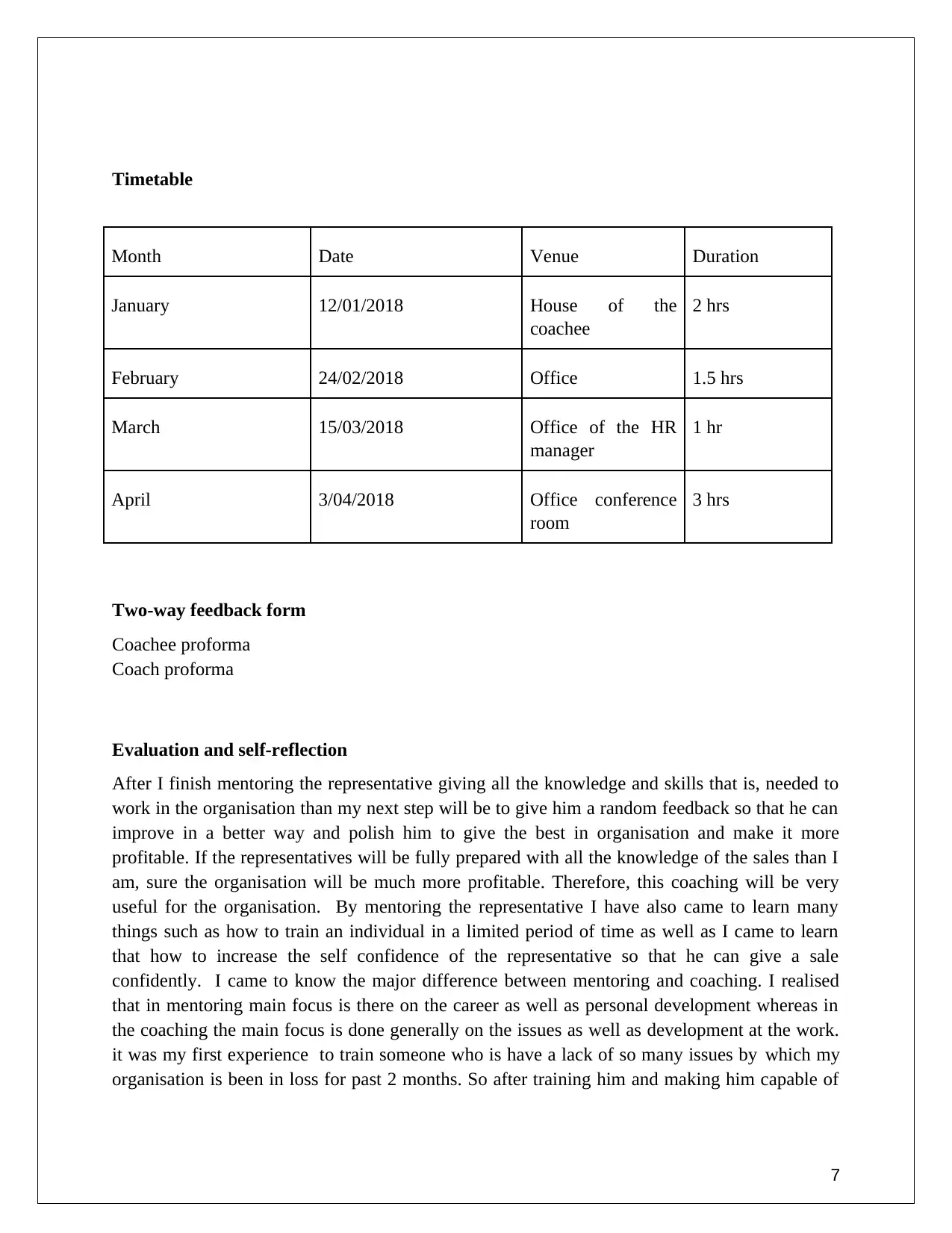
Timetable
Month Date Venue Duration
January 12/01/2018 House of the
coachee
2 hrs
February 24/02/2018 Office 1.5 hrs
March 15/03/2018 Office of the HR
manager
1 hr
April 3/04/2018 Office conference
room
3 hrs
Two-way feedback form
Coachee proforma
Coach proforma
Evaluation and self-reflection
After I finish mentoring the representative giving all the knowledge and skills that is, needed to
work in the organisation than my next step will be to give him a random feedback so that he can
improve in a better way and polish him to give the best in organisation and make it more
profitable. If the representatives will be fully prepared with all the knowledge of the sales than I
am, sure the organisation will be much more profitable. Therefore, this coaching will be very
useful for the organisation. By mentoring the representative I have also came to learn many
things such as how to train an individual in a limited period of time as well as I came to learn
that how to increase the self confidence of the representative so that he can give a sale
confidently. I came to know the major difference between mentoring and coaching. I realised
that in mentoring main focus is there on the career as well as personal development whereas in
the coaching the main focus is done generally on the issues as well as development at the work.
it was my first experience to train someone who is have a lack of so many issues by which my
organisation is been in loss for past 2 months. So after training him and making him capable of
7
Month Date Venue Duration
January 12/01/2018 House of the
coachee
2 hrs
February 24/02/2018 Office 1.5 hrs
March 15/03/2018 Office of the HR
manager
1 hr
April 3/04/2018 Office conference
room
3 hrs
Two-way feedback form
Coachee proforma
Coach proforma
Evaluation and self-reflection
After I finish mentoring the representative giving all the knowledge and skills that is, needed to
work in the organisation than my next step will be to give him a random feedback so that he can
improve in a better way and polish him to give the best in organisation and make it more
profitable. If the representatives will be fully prepared with all the knowledge of the sales than I
am, sure the organisation will be much more profitable. Therefore, this coaching will be very
useful for the organisation. By mentoring the representative I have also came to learn many
things such as how to train an individual in a limited period of time as well as I came to learn
that how to increase the self confidence of the representative so that he can give a sale
confidently. I came to know the major difference between mentoring and coaching. I realised
that in mentoring main focus is there on the career as well as personal development whereas in
the coaching the main focus is done generally on the issues as well as development at the work.
it was my first experience to train someone who is have a lack of so many issues by which my
organisation is been in loss for past 2 months. So after training him and making him capable of
7
Paraphrase This Document
Need a fresh take? Get an instant paraphrase of this document with our AI Paraphraser

giving a best output to the organisation, it really feels good because now my organisation will be
again in profit.
8
again in profit.
8
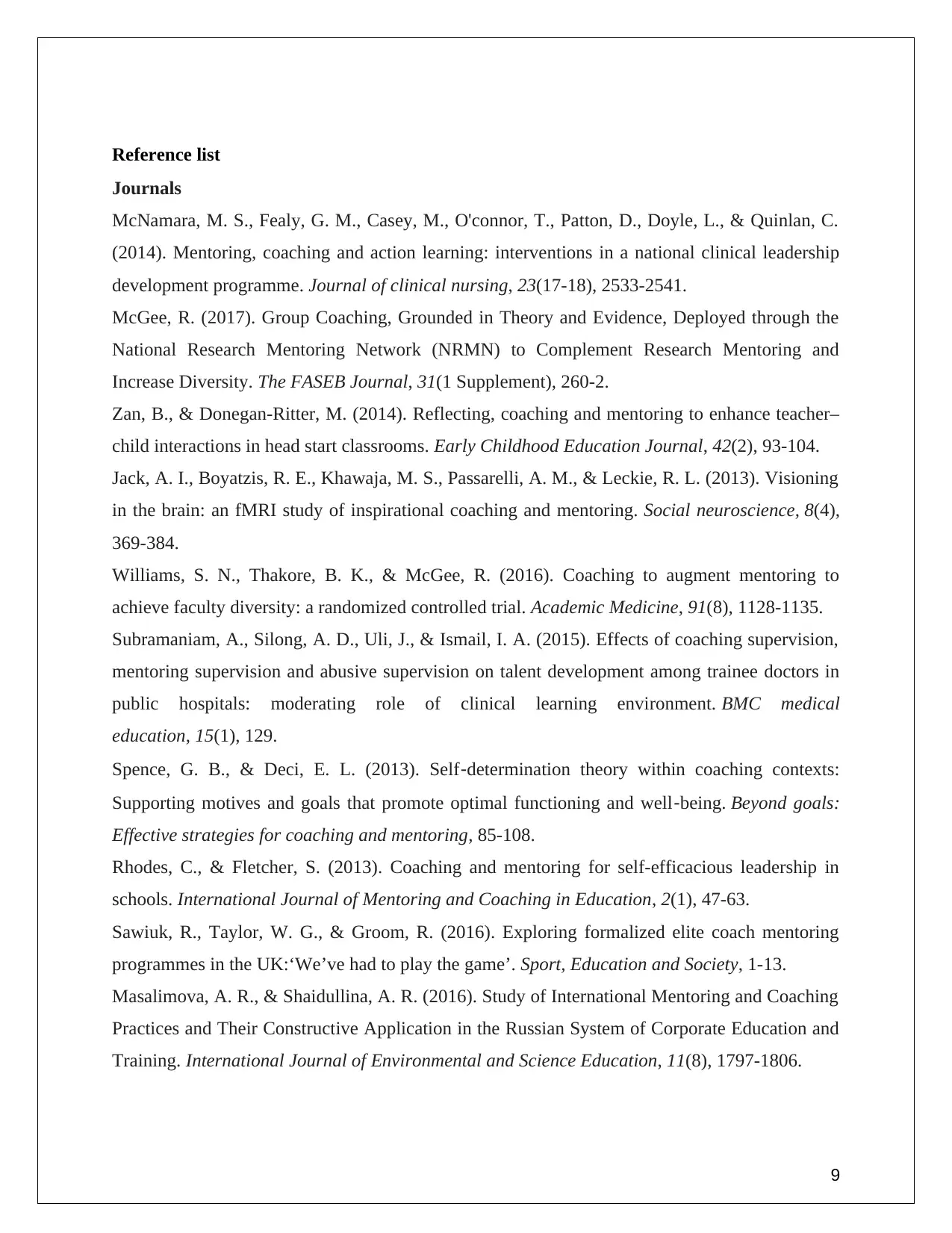
Reference list
Journals
McNamara, M. S., Fealy, G. M., Casey, M., O'connor, T., Patton, D., Doyle, L., & Quinlan, C.
(2014). Mentoring, coaching and action learning: interventions in a national clinical leadership
development programme. Journal of clinical nursing, 23(17-18), 2533-2541.
McGee, R. (2017). Group Coaching, Grounded in Theory and Evidence, Deployed through the
National Research Mentoring Network (NRMN) to Complement Research Mentoring and
Increase Diversity. The FASEB Journal, 31(1 Supplement), 260-2.
Zan, B., & Donegan-Ritter, M. (2014). Reflecting, coaching and mentoring to enhance teacher–
child interactions in head start classrooms. Early Childhood Education Journal, 42(2), 93-104.
Jack, A. I., Boyatzis, R. E., Khawaja, M. S., Passarelli, A. M., & Leckie, R. L. (2013). Visioning
in the brain: an fMRI study of inspirational coaching and mentoring. Social neuroscience, 8(4),
369-384.
Williams, S. N., Thakore, B. K., & McGee, R. (2016). Coaching to augment mentoring to
achieve faculty diversity: a randomized controlled trial. Academic Medicine, 91(8), 1128-1135.
Subramaniam, A., Silong, A. D., Uli, J., & Ismail, I. A. (2015). Effects of coaching supervision,
mentoring supervision and abusive supervision on talent development among trainee doctors in
public hospitals: moderating role of clinical learning environment. BMC medical
education, 15(1), 129.
Spence, G. B., & Deci, E. L. (2013). Self‐determination theory within coaching contexts:
Supporting motives and goals that promote optimal functioning and well‐being. Beyond goals:
Effective strategies for coaching and mentoring, 85-108.
Rhodes, C., & Fletcher, S. (2013). Coaching and mentoring for self-efficacious leadership in
schools. International Journal of Mentoring and Coaching in Education, 2(1), 47-63.
Sawiuk, R., Taylor, W. G., & Groom, R. (2016). Exploring formalized elite coach mentoring
programmes in the UK:‘We’ve had to play the game’. Sport, Education and Society, 1-13.
Masalimova, A. R., & Shaidullina, A. R. (2016). Study of International Mentoring and Coaching
Practices and Their Constructive Application in the Russian System of Corporate Education and
Training. International Journal of Environmental and Science Education, 11(8), 1797-1806.
9
Journals
McNamara, M. S., Fealy, G. M., Casey, M., O'connor, T., Patton, D., Doyle, L., & Quinlan, C.
(2014). Mentoring, coaching and action learning: interventions in a national clinical leadership
development programme. Journal of clinical nursing, 23(17-18), 2533-2541.
McGee, R. (2017). Group Coaching, Grounded in Theory and Evidence, Deployed through the
National Research Mentoring Network (NRMN) to Complement Research Mentoring and
Increase Diversity. The FASEB Journal, 31(1 Supplement), 260-2.
Zan, B., & Donegan-Ritter, M. (2014). Reflecting, coaching and mentoring to enhance teacher–
child interactions in head start classrooms. Early Childhood Education Journal, 42(2), 93-104.
Jack, A. I., Boyatzis, R. E., Khawaja, M. S., Passarelli, A. M., & Leckie, R. L. (2013). Visioning
in the brain: an fMRI study of inspirational coaching and mentoring. Social neuroscience, 8(4),
369-384.
Williams, S. N., Thakore, B. K., & McGee, R. (2016). Coaching to augment mentoring to
achieve faculty diversity: a randomized controlled trial. Academic Medicine, 91(8), 1128-1135.
Subramaniam, A., Silong, A. D., Uli, J., & Ismail, I. A. (2015). Effects of coaching supervision,
mentoring supervision and abusive supervision on talent development among trainee doctors in
public hospitals: moderating role of clinical learning environment. BMC medical
education, 15(1), 129.
Spence, G. B., & Deci, E. L. (2013). Self‐determination theory within coaching contexts:
Supporting motives and goals that promote optimal functioning and well‐being. Beyond goals:
Effective strategies for coaching and mentoring, 85-108.
Rhodes, C., & Fletcher, S. (2013). Coaching and mentoring for self-efficacious leadership in
schools. International Journal of Mentoring and Coaching in Education, 2(1), 47-63.
Sawiuk, R., Taylor, W. G., & Groom, R. (2016). Exploring formalized elite coach mentoring
programmes in the UK:‘We’ve had to play the game’. Sport, Education and Society, 1-13.
Masalimova, A. R., & Shaidullina, A. R. (2016). Study of International Mentoring and Coaching
Practices and Their Constructive Application in the Russian System of Corporate Education and
Training. International Journal of Environmental and Science Education, 11(8), 1797-1806.
9
⊘ This is a preview!⊘
Do you want full access?
Subscribe today to unlock all pages.

Trusted by 1+ million students worldwide
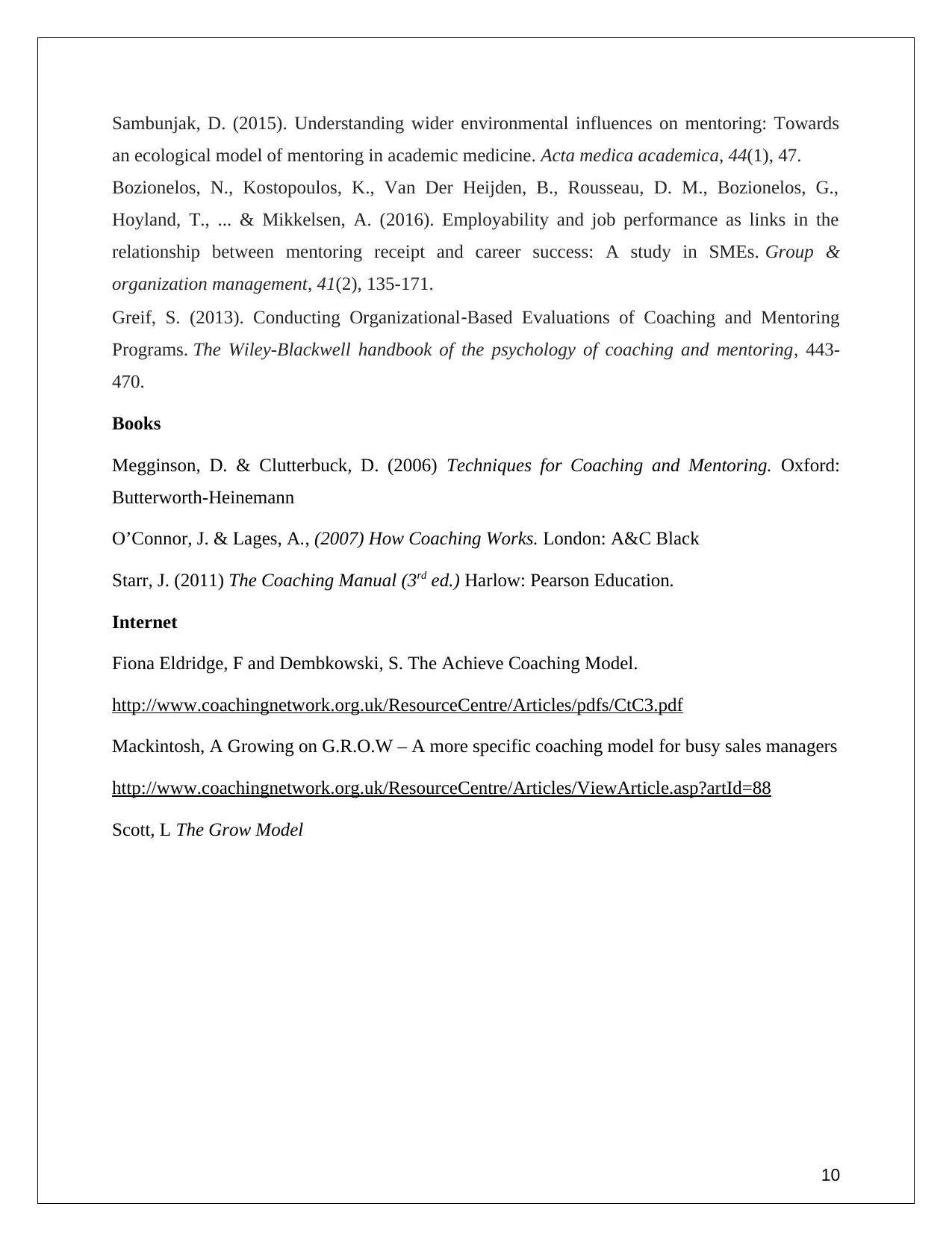
Sambunjak, D. (2015). Understanding wider environmental influences on mentoring: Towards
an ecological model of mentoring in academic medicine. Acta medica academica, 44(1), 47.
Bozionelos, N., Kostopoulos, K., Van Der Heijden, B., Rousseau, D. M., Bozionelos, G.,
Hoyland, T., ... & Mikkelsen, A. (2016). Employability and job performance as links in the
relationship between mentoring receipt and career success: A study in SMEs. Group &
organization management, 41(2), 135-171.
Greif, S. (2013). Conducting Organizational‐Based Evaluations of Coaching and Mentoring
Programs. The Wiley-Blackwell handbook of the psychology of coaching and mentoring, 443-
470.
Books
Megginson, D. & Clutterbuck, D. (2006) Techniques for Coaching and Mentoring. Oxford:
Butterworth-Heinemann
O’Connor, J. & Lages, A., (2007) How Coaching Works. London: A&C Black
Starr, J. (2011) The Coaching Manual (3rd ed.) Harlow: Pearson Education.
Internet
Fiona Eldridge, F and Dembkowski, S. The Achieve Coaching Model.
http://www.coachingnetwork.org.uk/ResourceCentre/Articles/pdfs/CtC3.pdf
Mackintosh, A Growing on G.R.O.W – A more specific coaching model for busy sales managers
http://www.coachingnetwork.org.uk/ResourceCentre/Articles/ViewArticle.asp?artId=88
Scott, L The Grow Model
10
an ecological model of mentoring in academic medicine. Acta medica academica, 44(1), 47.
Bozionelos, N., Kostopoulos, K., Van Der Heijden, B., Rousseau, D. M., Bozionelos, G.,
Hoyland, T., ... & Mikkelsen, A. (2016). Employability and job performance as links in the
relationship between mentoring receipt and career success: A study in SMEs. Group &
organization management, 41(2), 135-171.
Greif, S. (2013). Conducting Organizational‐Based Evaluations of Coaching and Mentoring
Programs. The Wiley-Blackwell handbook of the psychology of coaching and mentoring, 443-
470.
Books
Megginson, D. & Clutterbuck, D. (2006) Techniques for Coaching and Mentoring. Oxford:
Butterworth-Heinemann
O’Connor, J. & Lages, A., (2007) How Coaching Works. London: A&C Black
Starr, J. (2011) The Coaching Manual (3rd ed.) Harlow: Pearson Education.
Internet
Fiona Eldridge, F and Dembkowski, S. The Achieve Coaching Model.
http://www.coachingnetwork.org.uk/ResourceCentre/Articles/pdfs/CtC3.pdf
Mackintosh, A Growing on G.R.O.W – A more specific coaching model for busy sales managers
http://www.coachingnetwork.org.uk/ResourceCentre/Articles/ViewArticle.asp?artId=88
Scott, L The Grow Model
10
Paraphrase This Document
Need a fresh take? Get an instant paraphrase of this document with our AI Paraphraser

11

12
⊘ This is a preview!⊘
Do you want full access?
Subscribe today to unlock all pages.

Trusted by 1+ million students worldwide
1 out of 12
Related Documents
Your All-in-One AI-Powered Toolkit for Academic Success.
+13062052269
info@desklib.com
Available 24*7 on WhatsApp / Email
![[object Object]](/_next/static/media/star-bottom.7253800d.svg)
Unlock your academic potential
Copyright © 2020–2026 A2Z Services. All Rights Reserved. Developed and managed by ZUCOL.




